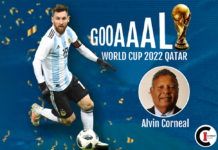It was always my feeling during my years as a coaching instructor in countries all over the world, that there should be more focus on the development of football in the Caribbean region. Of course, I have done numerous courses within the region and I’m pleased to see the efforts of students who have obtained the challenge of making a contribution to their respective countries.
However, while the major successes have come from Jamaica, and Trinidad/Tobago in the English Caribbean, my attention remains with the smaller regions, none of whom have made the step forward with consistency at Concacaf. I distinctly recall the input of Grenada some years ago, as well as St. Kitts/Nevis reaching far enough to experience a second-round encounter with Mexico.
Today, while FIFA has taken a direct initiative to improve the quality of play in countries, the job is placed within the hands of experienced local coaches. However, the task has become harder because of the structure which Concacaf has decided to utilize for the preliminary competitions. Because we’re often reluctant to challenge the format which is placed firmly, as a rule, it is only when the draw has been made that we see the difficult task for the minnows located in the Caribbean.

I have always believed that Caribbean administrators, should utilize the services of the more advanced coaches. By coming together for a period of two to three weeks per year in their attempt to help each other, with the problems they have been facing on the field through the use of dialogue.
The process of coach education does not provide the depth of tactics and techniques required on the field as the solitary task. The theory of teaching the very young players precedes the structure of coaching. Teaching the youths from “Blackboard” education brings a more productive route to both the coach and the students.
In the Caribbean, we tend to believe that anyone with some level of playing ability is good enough to get into a top school or club team to practice their “trade.” Unfortunately, the naturally talented will showcase their individual skills and win the admiration of the fans and the coaches. But the formality of elevating the quality of play will reflect when the message of success is exposed within the sessions. By focusing upon the individual skills as part of the collective process on the field, as well as the knowledge from the instructors of this great game.
I would certainly stand behind any effort to see the Caribbean work in tandem for the benefit of success for their clubs and schools in the system. All countries are advised to map out a plan for a period of four years. These should be aligned to develop the various age groups and placing emphasis upon their progress. The information gathered should be relayed to the learning coaches, some of whom are already recognized and have more experience.



















